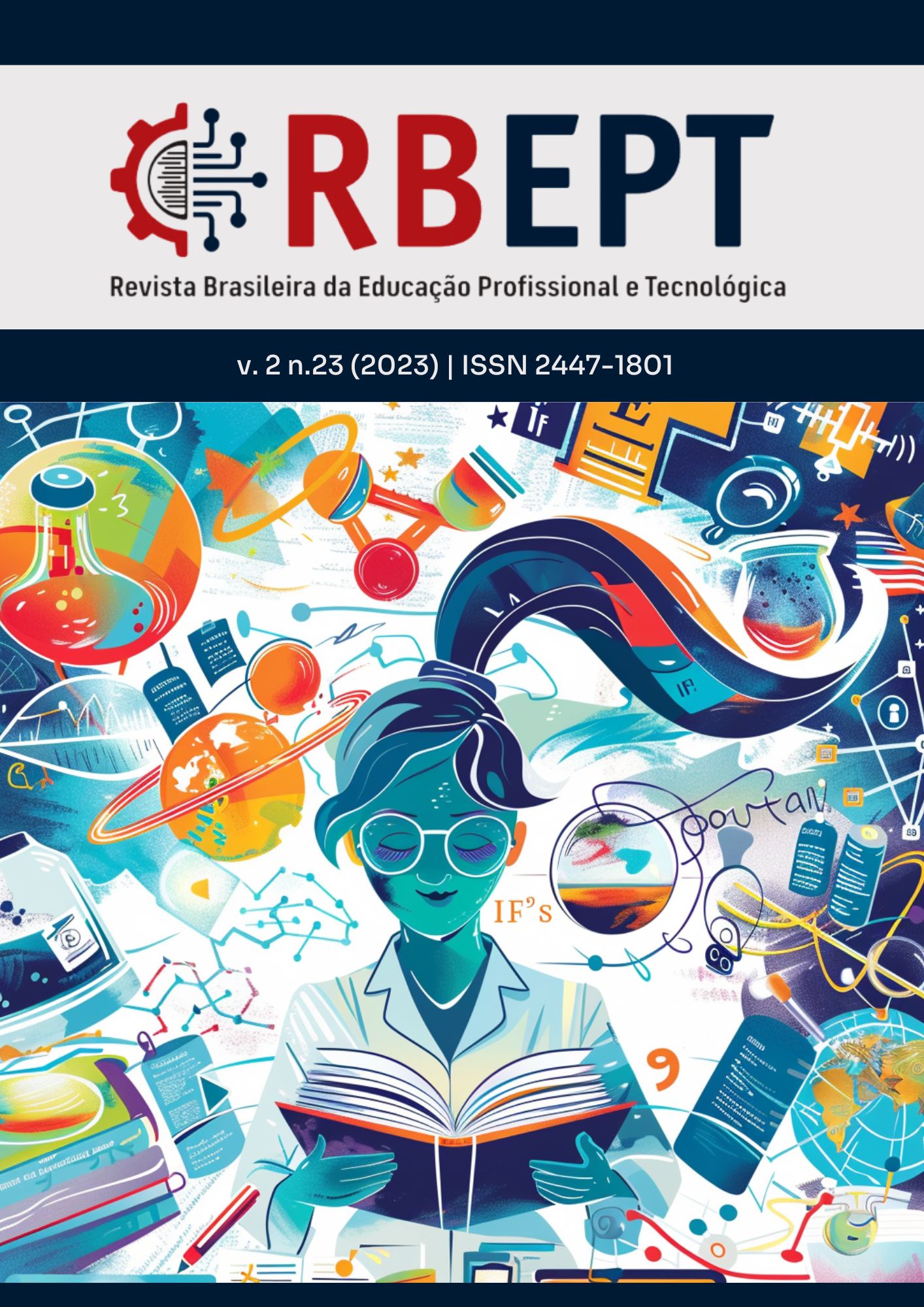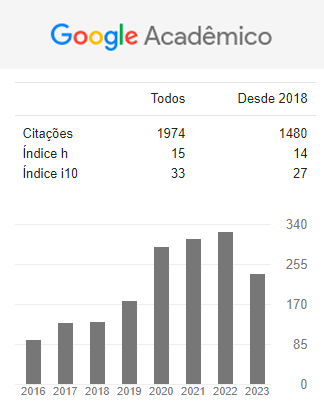Avaliação de competências transversais de estudantes de Engenharia
uma revisão da literatura
DOI:
https://doi.org/10.15628/rbept.2023.15221Palavras-chave:
Competências transversais, Avaliação de estudantes, Métodos de avaliaçãoResumo
Avaliar o grau de desenvolvimento das competências transversais de estudantes da área de tecnologia constitui-se atualmente em um desafio para as instituições de ensino. Este trabalho tem como objetivo levantar métodos existentes e analisar a produção de conhecimento acerca da avaliação de competências transversais de estudantes de engenharia. Foi realizada uma revisão integrativa de literatura, envolvendo artigos publicados entre 2010 e 2020. A pesquisa revelou maior enfoque na autoavaliação e o uso da avaliação por pares em trabalhos em equipe. Não foram identificados testes largamente aplicados para avaliação de competências transversais. As pesquisas sobre o tema vêm crescendo nos últimos dez anos e as lacunas apontadas constituem-se em importante subsídio para pesquisas futuras.
Downloads
Referências
ABDULLAH, Siti Rozaimah Sheikh; MOHAMAD, Abu Bakar; ANUAR, Nurina; MARKOM, Masturah; ISMAIL, Manal; ROSLI, Masli Irwan; HASAN, Hassimi Abu. A comparative analysis between direct and indirect measurement of year I integrated project. International Education Studies, v. 6, n. 6, p. 143-150, 2013. Disponível em: https://eric.ed.gov/?id=EJ1068416. Acesso em: 23 jan. 2022. DOI: https://doi.org/10.5539/ies.v6n6p143
ABET. Criteria for Accrediting Engineering Programs: Effective for reviews during the 2022-2023 accreditation cycle. Accreditation Board for Engineering and Technology, 2021. Disponível em: https://www.abet.org/accreditation/accreditation-criteria/criteria-for-accrediting-engineering-programs-2022-2023/. Acesso em: 19 de jan. de 2022.
ADRIAENSEN, Johan; BIJSMANS, Patrick; GROEN, Afke. Monitoring generic skills development in a bachelor European studies. Journal of Contemporary European Research, v. 15, n. 1, p. 110-127, 2019. doi:10.30950/jcer.v15i1.1018. DOI: https://doi.org/10.30950/jcer.v15i1.1018
AUSTRALIAN COUNCIL FOR EDUCATIONAL RESEARCH. Graduate skills assessment: summary report. Department of Education, Training and Youth Affairs, 2001.
BADCOCK, Paul B. T.; PATTISON, Philippa E.; HARRIS, Kerri-Lee. Developing generic skills through university study: a study of arts, science and engineering in Australia. Higher Education, v. 60, n. 4, p. 441-458, 2010. DOI: https://doi.org/10.1007/s10734-010-9308-8
BALDERAS, Antonio; DE-LA-FUENTE-VALENTIN, Luis; ORTEGA-GOMEZ, Miguel; DODERO, Juan Manuel; BURGOS, Daniel. Learning management systems activity records for students’ assessment of generic skills. IEEE Access, v. 6, p. 15958-15968, 2018. DOI: https://doi.org/10.1109/ACCESS.2018.2816987
BALDERAS, Antonio; PALOMO-DUARTE Manuel; DODERO, Juan M.; RUIZ-RUBE, Iván. A domain specific language for online learning competence assessments. International Journal of Engineering Education, v. 31, n. 3, p. 851-862, 2015.
BOTELHO, Louise L. R.; CUNHA, Cristiano C. de A.; MACEDO, Marcelo. O método da revisão integrativa nos estudos organizacionais. Gestão e Sociedade, [S. l.], v. 5, n. 11, p. 121–136, 2011. DOI: 10.21171/ges.v5i11.1220. Disponível em: https://www.gestaoesociedade.org/gestaoesociedade/article/view/1220. Acesso em: 23 jan. 2022. DOI: https://doi.org/10.21171/ges.v5i11.1220
BOŽIĆ, Marija; ĆERTIĆ, Jelena; VUKELIĆ, Milica; CIZMIĆ, Svetlana. New instructional approach for fostering generic and professional competences: Case study of the project and problem based learning engineering practice course. International Journal of Engineering Education, v. 34, n. 5, p. 1581-1591, 2018.
BRASIL. Conselho Nacional de Educação. Parecer CNE/CES no 1, de 23 de janeiro de 2019. Diretrizes Curriculares Nacionais do Curso de Graduação em Engenharia. Diário Oficial [da] República Federativa do Brasil, Brasília, DF, Seção I, p. 109, 23 abr. 2019a. Disponível em: < http://portal.mec.gov.br/index.php?option=com_docman&view=download&alias=109871-pces001-19-1&category_slug=marco-2019-pdf&Itemid=30192 >. Acesso em: 31 maio 2019.
BRASIL. Conselho Nacional de Educação. Resolução CNE/CES no 2, de 24 de abril de 2019. Diretrizes Curriculares Nacionais do Curso de Graduação em Engenharia. Diário Oficial [da] República Federativa do Brasil, Brasília, DF, Seção I, p. 43, 26 abr. 2019b. Disponível em: < https://www.in.gov.br/en/web/dou/-/resolu%C3%87%C3%83o-n%C2%BA-2-de-24-de-abril-de-2019-85344528 >. Acesso em: 31 maio 2019.
CANELAS, Dorian A.; HILL, Jennifer L.; NOVICKI, Andrea. Cooperative learning in organic chemistry increases student assessment of learning gains in key transferable skills. Chemistry Education Research and Practice, v. 18, n. 3, p. 441-456, 2017. DOI: https://doi.org/10.1039/C7RP00014F
CRAWLEY, Edward F.; MALMQVIST, John; LUCAS, William A.; BRODEUR, Doris R. Rethinking engineering education: the CDIO approach. 2ª ed. Editora Springer, 2014. DOI: https://doi.org/10.1007/978-3-319-05561-9
DIEZ, Elisabeth Viles; ZÁRRAGA-RODRÍGUEZ, Marta; GARCÍA, Carmen Jaca. Tool to assess teamwork performance in higher education. Intangible Capital, v. 9, n. 1, p. 281-304, 2013. DOI: https://doi.org/10.3926/ic.399
GILL, Grandon; RITZHAUPT, Albert. Systematically evaluating the effectiveness of an information systems capstone course: implications for practice. Journal of Information Technology Education: Research, v. 12, n. 1, p. 69-94, 2013. DOI: https://doi.org/10.28945/1776
HERRINGTON, Jan; HERRINGTON, Anthony. Authentic assessment and multimedia: how university students respond to a model of authentic assessment. Higher Education Research & Development, v. 17, n. 3, p. 305-322, 1998. DOI: https://doi.org/10.1080/0729436980170304
JONSSON, Anders. Rubrics as a way of providing transparency in assessment. Assessment & Evaluation in Higher Education, v. 39, n. 7, p. 840-852, 2014. DOI: https://doi.org/10.1080/02602938.2013.875117
KARLGREN, Klas; LAKKALA, Minna; TOOM, Auli; ILOMÄKI, Liisa; LAHTI-NUUTTILA, Pekka; MUUKKONEN, Hanni. Assessing the learning of knowledge work competence in higher education–cross-cultural translation and adaptation of the Collaborative Knowledge Practices Questionnaire. Research Papers in Education, v. 35, n. 1, p. 8-22, 2019. DOI: https://doi.org/10.1080/02671522.2019.1677752
KHAN, Imtiaz Hussain. The Impact of Appropriate Planning and Robust Evaluation Strategies on Continuous Improvement of Student Learning. International Journal of Online Pedagogy and Course Design (IJOPCD), v. 10, n. 3, p. 19-36, 2020. DOI: https://doi.org/10.4018/IJOPCD.2020070102
LAGUADOR, Jake M.; CHAVEZ-PRINSIPE, Nemy H.; DE CASTRO, Evelyn L. Employability Skill Development Needs of Engineering Students and Employers' Feedback on Their Internship Performance. Universal Journal of Educational Research, v. 8, n. 7, p. 3097-3108, 2020. DOI: https://doi.org/10.13189/ujer.2020.080738
LUTSENKO, Galina. Case study of a problem-based learning course of project management for senior engineering students. European Journal of Engineering Education, v. 43, n. 6, p. 895-910, 2018. DOI: https://doi.org/10.1080/03043797.2018.1454892
MESEGUER-DUEÑAS, José M.; VIDAURRE, Ana; MOLINA-MATEO, José; RIERA, Jaime; SALA, Rosa M. Validation of student peer assessment of effective oral communication in engineering degrees. IEEE Revista Iberoamericana de Tecnologias del Aprendizaje, v. 13, n. 1, p. 11-16, 2018. DOI: https://doi.org/10.1109/RITA.2018.2801897
MORENO, María Luisa Rodriguez De la evaluación a la formación de competencias genéricas: aproximación a un modelo. Revista Brasileira de Orientação Profissional, v.7, n.2, p. 33-48, 2006.
MOTAHHARI-NEJAD, Hossein. Professional competencies in engineering: examining validity and measurement invariance of a scale. Studies in Higher Education, p. 1-12, 2019. DOI: https://doi.org/10.1080/03075079.2019.1699524
OLMEDO-TORRE, Noelia; FARRERONS-VIDAL, Óscar. F. Assessment of the autonomous learning competence in engineering degree courses at the Universitat Politècnica de Catalunya. Journal of Technology and Science Education, v. 7, n. 2, p. 136-149, 2017. DOI: https://doi.org/10.3926/jotse.245
O’NEILL, Thomas A.; PEZER, Leah; SOLIS, Lorena; LARSON, Nicole; MAYNARD, Nicoleta; DOLPHIN, Glenn R.; BRENNAN, Robert W.; LI, Simon. Team dynamics feedback for post-secondary student learning teams: introducing the “Bare CARE” assessment and report. Assessment & Evaluation in Higher Education, p. 1-15, 2020. DOI: https://doi.org/10.1080/02602938.2020.1727412
PÉREZ-MARTÍNEZ, Jorge Enrique; GARCÍA, Javier; MUÑOZ, Isabel. Active learning and generic competences in an operating systems course. International Journal of Engineering Education, v. 26, n. 6, p. 1484-1492, 2010. Disponível em: https://oa.upm.es/32899/. Acesso em: 23 jan. 2022.
RUGE, Gesa; MCCORMACK, Coralie. Building and construction students’ skills development for employability–reframing assessment for learning in discipline-specific contexts. Architectural Engineering and Design Management, v. 13, n. 5, p. 365-383, 2017. DOI: https://doi.org/10.1080/17452007.2017.1328351
SANKARAN, Meenakshi; MOHANTY, Seemita. Student perception on achieved graduate attributes and learning experiences: a study on undergraduate engineering students of India. International Journal of Continuing Engineering Education and Life-Long Learning, v. 28, n. 1, p. 77-98, 2018. DOI: https://doi.org/10.1504/IJCEELL.2018.090247
SÁNCHEZ CARRACEDO, Fermín; SOLER, Antonia; MARTÍN, Carme; LÓPEZ, David; AGENO, Alicia; CABRÉ, Jose; GARCIA, Jordi; ARANDA, Joan; GIBERT, Karina. Competency maps: An effective model to integrate professional competencies across a STEM curriculum. Journal of Science Education and Technology, v. 27, n. 5, p. 448-468, 2018. DOI: https://doi.org/10.1007/s10956-018-9735-3
SANTOS, Simone C. PBL-SEE: an authentic assessment model for PBL-based software engineering education. IEEE Transactions on Education, v. 60, n. 2, p. 120-126, 2017. DOI: https://doi.org/10.1109/TE.2016.2604227
SANTOS, Simone C.; SOARES, Felipe S. F. Authentic assessment in Software Engineering education based on PBL principles a case study in the telecom market. In: 2013 35th International Conference on Software Engineering (ICSE). Proceedings... San Francisco: IEEE, 2013. p. 1055-1062.
STEIN, Barry; HAYNES, Ada; REDDING, Michael; ENNIS, Theresa; CECIL, Misty. Assessing critical thinking in STEM and beyond. In: ISKANDER, M. (Coord.). Innovations in e-learning, instruction technology, assessment, and engineering education. Springer, Dordrecht, 2007. p. 79-82. DOI: https://doi.org/10.1007/978-1-4020-6262-9_14
STEINER, Mark; KANAI, Junichi; HSU, Cheng; ALBEN, Richard; GERHARDT, Lester. Holistic assessment of student performance in multidisciplinary engineering capstone design projects. International Journal of Engineering Education, v. 27, n. 6, p. 1259-1272, 2011.
VIDIC, Andreja Drobnic. Assessment in problem-based learning incorporated into traditional engineering education: Difficulties and evaluation. International Journal of Engineering Education, v. 26, n. 3, p. 554-563, 2010.
ZABALA, Antoni; ARNAU, Laia. Como aprender e ensinar competências. Porto Alegre: Penso Editora, 2014.
ZHANG, Aimao. Peer assessment of soft skills and hard skills. Journal of Information Technology Education: Research, v. 11, n. 1, p. 155-168, 2012. Disponível em: https://www.learntechlib.org/p/111498/. Acesso em: 23 jan. 2022. DOI: https://doi.org/10.28945/1634
ZLATKIN-TROITSCHANSKAIA, Olga; SHAVELSON, Richard J.; KUHN, Christiane. The international state of research on measurement of competency in higher education. Studies in Higher Education, v. 40, n. 3, p. 393-411, 2015. DOI: https://doi.org/10.1080/03075079.2015.1004241
Downloads
Publicado
Como Citar
Edição
Seção
Licença

Este trabalho está licenciado sob uma licença Creative Commons Attribution 4.0 International License.
O autor na submissão do artigo transfere o direito autoral ao periódico. À Revista Brasileira da Educação Profisisonal e Tecnológica ficam reservados os direitos autorais pertinentes a todos os artigos nela publicados.


























